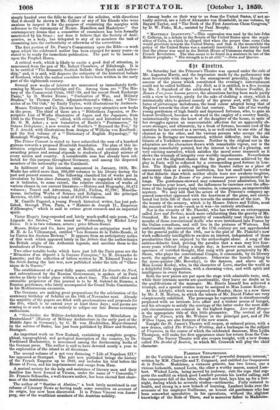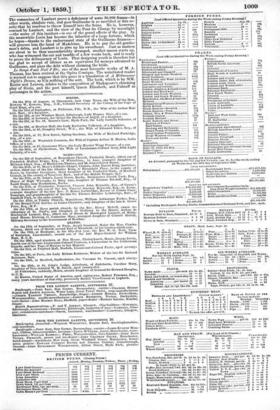PARISIAN THEATRICALS.
At the Varietes there is a new drama of " powerful dramatic interest," written by MM. Clairville and T. Coignard, and entitled Les Compagnons de la Truelle. Madeleine, a virtuous grisette, has two lovers, one a vicious locksmith, named Lorin, the other a worthy mason, named Lam- bert. Wicked Lorin, being moved by jealousy, cuts the rope that sup- ports the scaffold on which good Lambert pursues his lawful calling, and the consequent fall of the latter, though not fatal, lays him up for a fort- night, during which he severely studies—arithmetic. Fully restored to health, and strong in a new branch of learning, Lambert looks over the accounts of his employer Guillaume, an honest old gentleman who has been somewhat speculative in his operations, without the slightest knowledge of the Rule of Three, and is moreover father to Madeleine.
The researches of Lambert prove a deficiency of some 30,000 franca—in other words, absolute ruin, and poor Guillaume is so mortified at this re- sult,-that he resolves to throw himself into the Seine. He is, however, rescued by Lambert, and the view of the Pont du Change by moonlight —the scene of this incident—is one of the grand effects of the play. In the meanwhile Lorin has become the inheritor of a large fortune, which he hopes—thanks to the embarrassed state of the Guillaume finances— will procure him the hand of Madeleine. He is to pay the old gentle-, man's debts, and Lambert is to give up his sweetheart. Just as matters are about to be thus uncomfortably arranged, another mason starts up, who has witnessed the cut and tumble of a few weeks back, and is ready to prove the delinquency of Lorin. That designing youth is therefore but too glad to accept of silence as an equivalent for moneys advanced to Guillaume, and pays the debt without claiming the bride. Le Songe d'une Nuit d'Ete", one of the moat favourite works of M. A. Thomas, has been revived at the Opera Comique. The uninitiated reader is warned not to suppose that this piece is a translation of A Midsummer Night's Dream, as it is nothing of the sort. The book, which is by MM. Rosier and Leuven, relates to the composition of Shakspeare's charming play of Merle, and the poet himself, Queen Elizabeth, and Falstaff as personages in the action.



























 Previous page
Previous page